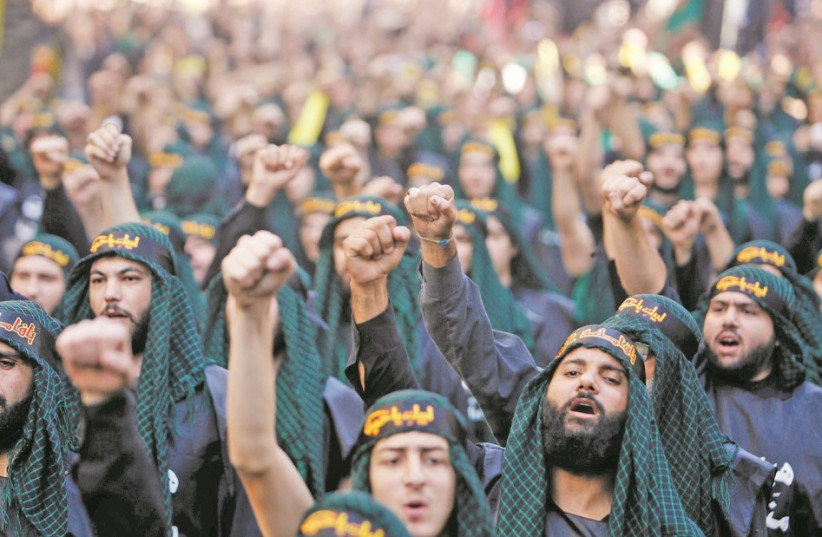Why is the Arab League reaching out to Hezbollah?
Reports over the weekend suggested the Arab League is shifting its position on Hezbollah. According to the reports, the Arab League Assistant Secretary-General Hossam Zaki spoke at length with Lebanese parliament Hezbollah member Mohammed Ra’ad. “Zaki reportedly said there should be no additional escalation and that Lebanon should choose a new president to fill the long-vacant position,” the New Arab reported.
There is a lot of speculation that this means the Arab League no longer views Hezbollah as a terrorist group. However, there is still lack of clarity on whether this implies a trend in the region among the league members or whether it is merely designed to brief the league due to concerns about a possible war between Israel and Hezbollah in Lebanon.
According to Al-Akhbar in Lebanon, which is considered sympathetic to Hezbollah, Zaki was visiting the country and held several important meetings. For instance, he spoke with the commander of the Lebanese army and several other factions.
“The most prominent meeting was with the head of the Loyalty to the Resistance bloc, MP Mohammad Raad,” the newspaper said. “This was the first contact between the two sides in more than ten years, especially since the Arab League had accepted the Saudi-Emirati request and approved in 2016 the classification of Hezbollah as a terrorist organization.”
According to this report, “as for the content, the sources revealed that ‘Zaki informed Hezbollah that the university decided to remove the terrorist designation against him, and it believes that he has a major role in the future of Lebanon.’ He also called for accelerating the presidential elections, pointing out the difficulty of electing any of the known candidates, and considering that ‘the solution is to agree on the third solution.’

“While Representative Raad did not comment on the issue of party classification, he repeated in the presidential file the position in support of [presidential candidate] Franjieh while emphasizing openness to any discussion, but the other party refuses dialogue.”
This section of the report appears to illustrate that the wider context is not the possible conflict with Israel, but actually Lebanese politics.
MEANWHILE, Anadolu media in Turkey also reported on the meetings. “In a televised statement on the Egyptian Al-Qahera News Channel the day after he concluded his visit to Beirut, Hossam Zaki said: ‘In previous Arab League decisions, Hezbollah was designated as a terrorist organization, and this designation was reflected in the resolutions, leading to the severing of communication based on these decisions.’”
This report leaves some confusion. “The member states of the League agreed that the label of Hezbollah as a terrorist organization should no longer be employed,” Zaki said. “The designation of Hezbollah as a terrorist organization no longer applies… the Arab League does not maintain terrorist lists and does not actively seek to designate entities in such a manner,” he indicated. I searched for the original Al-Qahera report of this statement and could not find it. It is apparently a translation of a short video segment.
Lebanese politicians push back against Hezbollah actions
It’s worth noting that Lebanese politicians who met with Zaki pushed back against Hezbollah’s actions, which are escalating toward war with Israel. Lebanon24 media noted that “the head of the Phalange Party stressed his rejection of Hezbollah monopolizing decisions on war and peace and dragging Lebanon into a war that will only bring it tragedies. It has proven that it did not and will not serve Gaza or the two-state solution that grants the Palestinians their right to a viable homeland, which is the only way out to stop the war and stabilize the region.”
MEANWHILE, the pro-Hezbollah Al-Mayadeen characterized Zaki’s visit as also reversing eight years during which Hezbollah was viewed as a terror group by the league. “Zaki pointed out that the issue of the war in the south took a significant amount of time in communications, expressing his hope that things would not develop because ‘the evidence coming from the Israeli side is worrying and expresses a desire to expand the war on Lebanon, which is rejected by the Arab League,’” the report said. This is important because it shows that the goal of the league is to prevent a wider conflict.
In most cases, there is no clear evidence about how the Arab League has officially changed its position. On the other hand, the decision by Zaki appears to come as the league has normalized ties with the Syrian regime and the Syrian regime, which has close ties to Hezbollah.
The terrorist group intervened to back the region in 2012. The decision by the Arab League to view Hezbollah more negatively came in the context of the Syrian civil war. Therefore, with the war largely over, it makes sense that the league may be more open to talks with Hezbollah.
It’s worth noting the meeting was with a Hezbollah member of parliament in Lebanon, so the league can argue this is merely a formality and a meeting with parliamentarians. Ra’ad was recently slammed in Lebanon for comments in which he critiqued Lebanese citizens for going to the beach and to nightclubs during the tensions with Israel.
The overall context here is that the region is concerned about possible war. Countries are considering asking their citizens to leave, and reports say some countries, such as Saudi Arabia, are already urging citizens to leave Lebanon. The Kingdom of Jordan has also advised citizens against travel there.
The Arab League isn’t the only one doing outreach to Hezbollah. According to reports, on Thursday, a Qatari official is also traveling to Beirut to meet with Hezbollah. This report also appeared at Al Akhbar, clearly showing that the Lebanese daily paper has an interest in trumpeting the meetings with Hezbollah and officials in the region. This is designed to legitimize the terrorist group and make it seem like it is playing a major role negotiating on behalf of Lebanon.





Comments are closed.